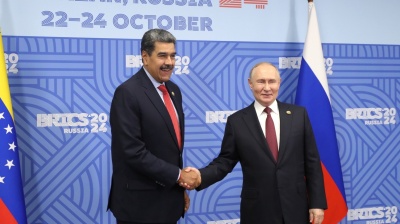Nicaragua has formally endorsed Russia's annexation of four Ukrainian regions, becoming one of the few nations to explicitly back Moscow's territorial claims as President Vladimir Putin seeks international legitimacy for his seizure of sovereign territory amid his ongoing conflict with Kyiv.
The Central American country's co-presidents Daniel Ortega and Rosario Murillo dispatched a message to Putin declaring: "On behalf of the government and people of Nicaragua, we express our full support and full recognition of the Donetsk, Kherson, Luhansk and Zaporizhzhia regions as an integral part of the territory of the Russian Federation."
The statement, published through state-affiliated outlet El 19 Digital, saw Nicaragua's leadership voice solidarity with Russian families whilst fully endorsing the objectives of Moscow's “special military operation.” Putin formally incorporated the four regions through signed treaties in September 2022, though the annexations have been widely condemned as violations of international law.
The move cements Nicaragua's position as one of Moscow's most reliable allies in Latin America. At June's Eurasian Economic Forum, Nicaraguan Presidential Special Representative Laureano Facundo Ortego Murillo, a son of the presidential couple, proclaimed his country's solidarity with Russia in what he termed the “fight against fascism in Ukraine.”
Intelligence hub for Moscow
Nicaragua's diplomatic support coincides with its emergence as a pivotal centre for Russian espionage activities across Latin America. The country, ruled by what critics describe as a marital dictatorship with close relatives controlling key government positions, reportedly hosts sophisticated surveillance infrastructure including SORM-3 technology that facilitates extensive communications interception capabilities.
Research from Florida International University identifies Nicaragua's Cerro Mokorón information processing facility as operating under direct supervision of Russian intelligence services. Analysts believe these technologies prove essential for maintaining authoritarian control Kremlin-aligned regional regimes such as Venezuela, Nicaragua and Cuba.
The surveillance systems showcased their effectiveness during Nicaragua's 2018 political turmoil, when the Ortega-Murillo administration deployed these capabilities to target student protest leaders. The subsequent crackdown resulted in more than 300 fatalities according to UN figures.
Military and media cooperation
The Moscow-Managua partnership extends into propaganda activities. Last year, Vice-President Murillo expressed solidarity with RT editor-in-chief Margarita Simonyan following US sanctions against Moscow's media apparatus. The Kremlin broadcaster sealed a strategic alliance with Nicaraguan state media in 2023, sparking concerns about Russian propaganda penetration in the region.
Yet most importantly, military cooperation represents another expanding dimension. Nicaragua and Russia are finalising a comprehensive partnership agreement, to be signed before the end of this year, encompassing 16 areas of collaboration, from tactical training to intelligence sharing. The accord could enable Russian forces to transfer combat experience gained during the Ukraine war to Nicaragua's military establishment.
Additional agreements include cybersecurity training arrangements aimed at establishing “a joint action plan on information security and specialist training,” according to Laureano Ortega Murillo, who visited Moscow on May 9 to take part in Victory Day celebrations in lieu of his elderly parents.
This comes as Russia and China intensify competition with the United States for regional influence over what the Trump administration views as “America’s back yard,” in line with the controversial Monroe Doctrine.
For Nicaragua, the relationship represents continuity with Cold War-era partnerships. Ortega, often described as Putin's closest Central American ally, previously cultivated Soviet ties during his 1979-1990 Sandinista government when Nicaragua received substantial weapons shipments following the overthrow of the US-backed Somoza dictatorship.
Since returning to power in 2007, Ortega has jailed hundreds of opponents, eliminated presidential term limits, shut down multiple civil and religious organisations and consolidated control over all branches of the state.
The country's deepening ties with Russia, China and Iran create new models for authoritarian cooperation and position Nicaragua as a strategic outpost for autocratic powers in the Western Hemisphere. According to exiled opposition leader Felix Maradiaga, who recently spoke to bne IntelliNews, the nation has become an “aircraft carrier” for such powers to operate across Latin America, posing a danger to democratic institutions for the entire region.
The territorial recognition of Ukraine's occupied lands is yet another sign of Managua's commitment to strengthening relations with Russia across military, technological and intelligence spheres, laying the groundwork to become a full-fledged conduit for Moscow's regional ambitions.
News

Ukraine’s elite HUR forces turn the tide in the battle for Pokrovsk, as Russia’s effort to capture key logistics hub fails
The battle for Pokrovsk became intense early on November 1and it looked like the fall of the key logistics hub to Russia was imminent. But a bold counterattack by Ukraine’s elite HUR forces seems to have turned the tide.

US prepares attack on Venezuela as Maduro begs Putin for aid
The Trump administration has reportedly drawn up a list of potential military targets within Venezuela as part of its intensifying pressure on President Nicolás Maduro, who has turned to Moscow seeking urgent military assistance.

Bulgaria suspends fuel exports to EU after US sanctions Lukoil
Bulgaria has temporarily suspended exports of petroleum products to European Union countries after the United States imposed sanctions on Russian oil giant Lukoil.

Tens of thousands rally in Serbia's Novi Sad one year after deadly station collapse
Tragedy that killed 16 people has become a symbol of public anger over corruption and negligence, fueling Serbia’s largest protest movement in more than a decade.

.jpeg)